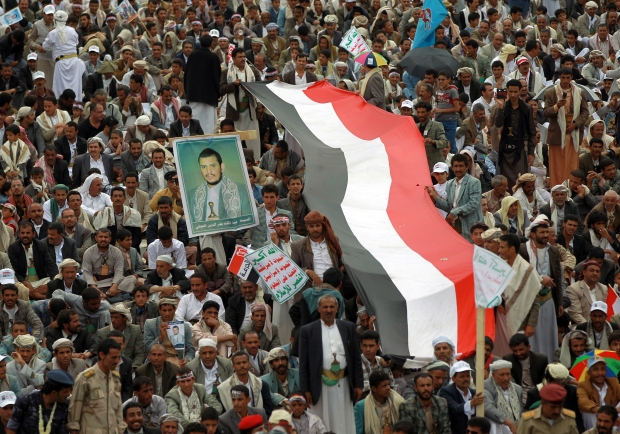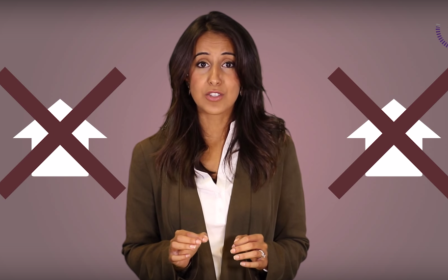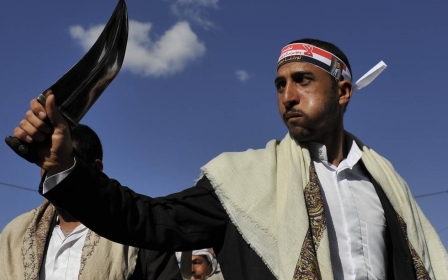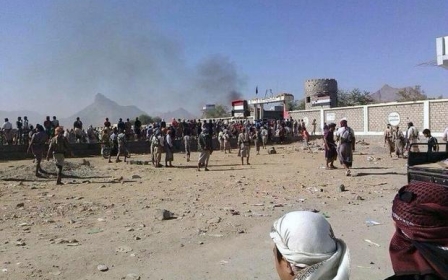From protester to politician: The rise of a Houthi revolutionary
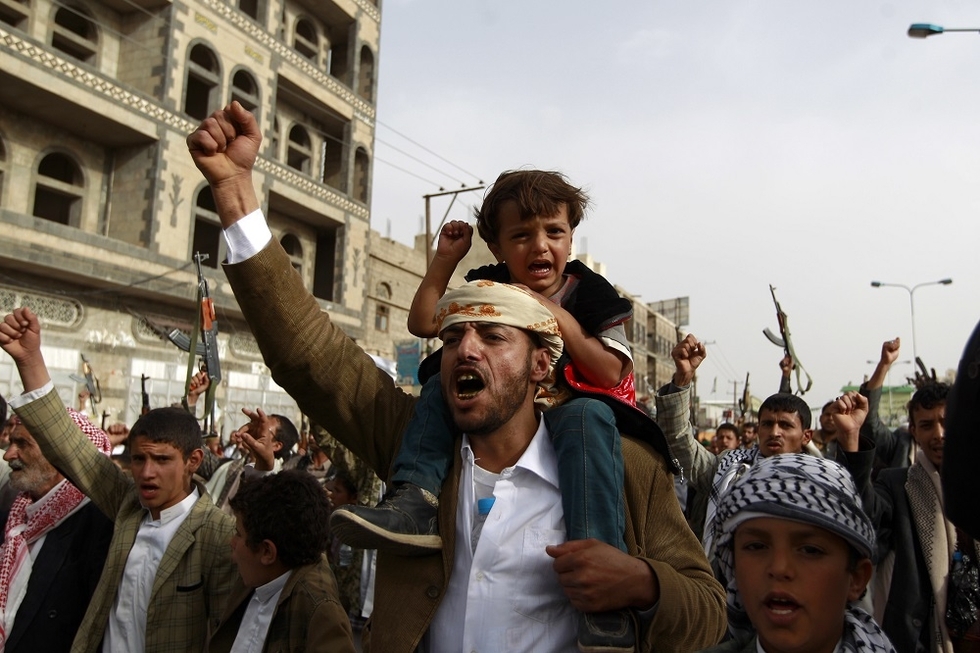
SANAA - Watching Ali Al-Emad walk into the Sheba hotel in Sana’a surrounded by his entourage of guards, I recalled our first encounter in 2011, and his meteoric rise - and that of the Houthis – in the five years since. I remembered our friendship and my journey reporting on the Houthis’ rise from the end of the sixth war in Saada in 2011 to the present, with almost all of northern Yemen today under their control.
It was late one night in September 2011 in Tahir (“Change”) Square when I first met Ali Al-Emad in a small candle-lit tent. We got talking about the revolution and I asked him the question I’d been posing every protester I met on the square: Why was he there? Almost everyone had given me the same answer - “We want more democracy” – but Ali was different.
Instead, he told me about the Houthis and their struggle, about their intermittent fighting against the government since 2004 and the unilateral military operations Saudi Arabia had waged against the Houthis along its border with Yemen in 2009, when the country was still led by President Ali Abdullah Saleh, a long-time autocrat and US ally.
While Yemen’s population is mostly Sunni, the Houthis belong to an offshoot of Shia Islam known as Zaidism. In the wake of the American-led invasion of Iraq in 2003, Hussein al-Houthi, the community’s leader, promptly moved to capitalise on popular anger by launching a rebellion against Saleh. Though al-Houthi was killed soon afterwards, in 2004 his followers, mostly based in the northern region of Saada, continued the fight until the signing of a 2010 ceasefire.
I remember seeing the stickers and posters around Ali’s tent in Tahir Square, all bearing the Houthis’ battle-cry slogan:
God is great
Death to America
Death to Israel
God curse the Jews
Victory to Islam
Only later would I come to understand why there was so much hatred directed towards America among his community.
That first encounter with Al-Emad ignited my curiosity about the Houthis, but when I asked him to take me to Saada; he simply replied “You can try.” My confusion over this dissipated quickly once on our way, as I realised we were being questioned at every other checkpoint along the road to Saada. Some of these were manned by Saleh loyalists, others by the Houthis. At the time, Saleh didn’t want any media going to report on the Houthis’ story. However, Ali had me covered, quite literally: I spent the journey wearing a tent-like veil - not even my eyes were showing – that turned out to be an excellent disguise for my filming equipment.
Ali also arranged for a young Houthi, an AK47 strapped over his shoulder, to accompany me into Saada and get me through Houthi checkpoints. When I say he was “young”, I do mean just that: he must have been, at most, 14 or 15 years of age. While seeing a teenager with a weapon was shocking at the time, this was soon to become a common sight around Houthi-controlled areas in Yemen.
During my trip to Saada, I heard testimony upon testimony of families who had lost fathers, mothers, sons and daughters in the course of the six wars. Everywhere I went there were remains of the weapons and munitions used by the Saudis and Saleh against the local population. Most were American-made; stark reminders of why anti-US sentiment was so widespread there.
I was taken to the Houthi safe-house in Saada and had the opportunity to meet some of the key leaders. “Never will we let the scenario of Ali Abdullah Saleh repeat itself,” Mohammed Badreddine Al-Houthi told me. I was so struck by the evident sincerity of his bold and defiant remark that it came as quite a shock to witness him backtrack on it so decisively in the years since, as political imperatives displaced rhetorical ones.
In October 2012, not long after my return from Saada, and as the shockwaves of the Arab Spring rippled through the region, Saleh was ousted. He was swiftly replaced by Abd Rabbu Mansour Hadi, his long-time vice-president, in a peaceful transfer of power orchestrated by the Gulf countries and the West.
The Houthis, however, were not happy, publicly rejecting the Gulf initiative even though it achieved the removal of their arch-enemy Saleh. Instead, they saw the move as a conspiracy by Saudi Arabia and the United States - the initiative’s main supporters – to hijack Yemen’s revolution, especially when so many among the military elite, notably members of the Islah (Muslim Brotherhood) party which had supported the six wars against the Houthis, had been allowed to keep their positions and privileges. Despite Saleh’s downfall, the Houthi leadership felt not enough change had taken place.
When I received news of Saleh’s ousting, I called Ali – as I had other friends from my Tahir Square days - to congratulate him. He told me that even though most protesters had packed their bags and left the square, he and his fellow Houthis had remained there to call for everyone in Yemen’s ruling elite to step down. More change was needed, he insisted.
In 2013, to the surprise of many observers, both locally and abroad, the Houthis emerged as key players in the National Dialogue Conference (NDC), an initiative involving representatives from across Yemen’s diverse communities. The goal was to set the country on a new path by adopting a new constitution and organising democratic elections. As a GCC initiative, however, the NDC was funded by the Gulf monarchies and, of course, supported by the US. As such, through their participation in the dialogue, the Houthis seemed to signal their implicit approval of the Hadi power transfer, despite their public disavowals and condemnations of it.
Throughout 2013, the Houthis’ popularity surged significantly amongst the Yemeni public. This was not because of their religious ideology but rather, the growing perception they “brought something new to the table,” as well as an increasingly alarming political vacuum. Support for the Houthis rose markedly, especially as the transitional government was seen to be failing to respond to the people’s needs.
In the five years since Saleh’s downfall, the Houthis have grown into a broad national political movement. They call themselves Ansar Allah – God’s Allies – and are currently battling the government as well as al-Qaeda in the Arabian Peninsula (AQAP). Supporters were hopeful they could tackle rampant corruption and restore the stability that had eluded Yemen since the Arab Spring. However, while the Houthis did confront corrupt politicians and practices as part of their “revolutionary committee campaign”, they had also lost the Yemeni economy billions through mismanagement and bad economic decisions.
With things getting out of control at the beginning of 2015, President Hadi resigned and the Houthis kept him and some of his aids hostages under home detention. I was in Yemen at the time, and it was a truly surreal experience seeing the Houthis gaining so much support on their way from Saada to Sanaa, within such a short space of time. Overnight, pro-Houthi graffiti seemed to appear on the walls of narrow alleys across Sanaa; new checkpoints were set up while old ones were quickly covered in Houthi slogans.
Of course, it’s important to point out that the Houthis could have never made it this far had it not been for the support of Saleh and Hadi’s litany of mistakes. Moreover, tribes and army factions loyal to Saleh, by refusing to resist militarily the Houthis’ progress from Saada to Sanaa, essentially paved the way for their advances.
An unlikely alliance thus emerged between Saleh and the Houthis, sealed by a common enemy, the Islah party. Very soon, however, it became apparent that the Houthis were being overwhelmed by the pressures and demands of exercising power and control over substantial swathes of Yemeni territory. They seemed to have morphed as a movement, their ambition no longer simply to be recognised but to expand and dominate which, with Saleh’s support, they now knew was a real possibility. They did not, however, seemed to have given much consideration to the question of what to do next.
At the end of February 2015, President Hadi escaped his house arrest and fled to Aden, where he retracted his resignation and declared the Houthi administration illegitimate. It was then that the real war began. The Houthis followed Hadi to Aden, and the city came under siege. Hadi fled the country, before resurfacing, two weeks later, in Riyadh. Soon after, the Saudis started their relentless bombing campaign, which continues to the present day.
Nearly three months into the campaign, in March 2015, the United Nations held peace talks in Geneva, attended by delegates from the government in exile in Saudi Arabia as well as others from Yemen, including the Houthis. This is where I found myself face-to-face with Ali again.
My fellow journalists and I had been waiting the whole day in the hotel lobby for the Houthi delegation to arrive, and were given scant details regarding why it had been delayed or who would be coming. You could imagine my surprise seeing Ali, my friend in jeans and t-shirt from Tahir Square suddenly stroll into the UN conference venue as a leader of the delegation.
Recognising him as he came out of the lift, I was momentarily confused. What was he doing here in Geneva? I watched as the whole press scrum ran up to him, pointing their cameras and prodding him with their microphones in hope of extracting an exclusive quote…
As he caught my eye, he nodded in recognition. “Hello Ali… someone got a promotion!” I started. “Call me Mr Ali, please,” was his curt reply. I realised he was no longer “my friend from Tahir Square”. He had attained a position of power that nobody, least of all him, could have imagined; a position - many would argue –he was supremely unqualified for. The kid from Tahir Square, who had spoken to me so passionately about the plight of the Houthis not so long ago, was now Mr Ali, prominant figure of the Revolutionary Committee, suddenly shielded from fellow citizens by the trappings of power, from personal secretaries to appointment diaries. Watching him, I felt his was a personal transformation that perfectly captured the astonishing rise of the Houthis. Neither expected to get this far.
To my question about the Houthi alliance with Saleh, Ali responded with a rehearsed answer: the GPC was a political party and, as such, was willing to ally itself with any party that had Yemen’s best interests at heart. I persisted: “but Saleh waged six wars against you!” But the Houthi narrative had changed: it was no longer Saleh who had waged those six wars against them but the Islah party, through its influential control of the army faction in charge of the fighting against them. The denial was remarkable but hardly likely to fool anyone. After all the Houthis knew, better than anyone, that their swift ascent and expansion would have been impossible without Saleh’s endorsement and support.
Today, the Houthis continue their quest to keep a very tight grip on all institutions across Yemen. The tighter the grip, however, the more of people’s loyalty they are allowing to slip through their hands.
While their military prowess is unquestionable, having the military skills for winning battles in the streets of Sanaa is no substitute for the political and organisational skills needed to run a country once the guns fall silent. The Houthis, so adept at the art of battle, have shown themselves completely out of their depth when it comes to the hard struggle of politics and governance. As they face the real prospect of a swift and disastrous collapse, they risk bringing a whole country down with them.
During my recent visit to Yemen, in September 2015, I became aware of the stark shift in public feeling towards the Houthis across the country. People who had once been staunch supporters because they believed in their long-term aspirations had become disillusioned by their seeming lack of political foresight and vision.
As someone put it to me at a late-night qaat-chewing session as Saudi jets flew overhead in Sanaa: “We liked them when they came in and made the petrol prices go down, but now we have to deal with the Saudi airstrikes, the anti-aircraft fire from the Houthis, and everything, including fuel, is so expensive… we no longer want the Houthis - or Hadi for that matter - we just want things to go back to how they were before the revolution.”
This was hardly an isolated view; almost everyone I spoke to in Sana’a was tired of the war, so tired they were now perfectly willing to consider the return of Saleh. Reflecting on this dramatic reversal, I wondered if this was what Saleh sought and had been working towards all along.
Our encounter last week was the last time I saw Ali. As he walked into the hotel lobby, surrounded by acolytes, I considered whether the Houthis would really pull out of the North, as had been mooted, and return to Saada.
If this were to happen, I could not help but wonder: what will Ali Al-Emad do next?
New MEE newsletter: Jerusalem Dispatch
Sign up to get the latest insights and analysis on Israel-Palestine, alongside Turkey Unpacked and other MEE newsletters
Middle East Eye delivers independent and unrivalled coverage and analysis of the Middle East, North Africa and beyond. To learn more about republishing this content and the associated fees, please fill out this form. More about MEE can be found here.


